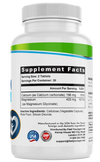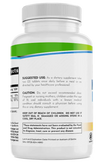Magnesium Glycinate is a unique compound where Magnesium is coupled with two Glycine amino acid molecules. This enhances its bioavailability, allowing your body to absorb it more efficiently. Consequently, this magnesium supplement provides a quicker absorption rate compared to standard supplements.
Bioavailable Magnesium Glycinate Capsules 425mg with Calcium
Magnesium Glycinate is a unique compound where Magnesium is coupled with two Glycine amino acid molecules. This enhances its bioavailability, allowing your body to absorb it more efficiently. Consequently, this magnesium supplement provides a quicker absorption rate compared to standard supplements.
- Product Description
- Supplement Facts
Do you struggle with…
Low Energy
Stress/Anxiety
High Blood Pressure
Problems Sleeping
Hormonal Imbalances
Palpitations/irregular heartbeat
Blood sugar imbalances
Headaches
Muscle Weakness, Twitches or cramps
If so, it’s possible you may have suboptimal levels of magnesium, and, if so, that taking supplemental Magnesium may be able to help
Commonly reported benefits of having optimised levels of magnesium may include[1]:
Improved Exercise Performance
Reduced Depression
Healthy blood sugar levels
Optimised Blood Pressure and other heart health biomarkers
Reduced Inflammation
Improved Bone Health
Reduced PMS symptoms
Better Sleep
Reduced Anxiety
What is Magnesium?
Magnesium is an important mineral that’s crucially important for your body to function properly.
It’s the fourth most abundant mineral found in your body[2] and it’s essential to all living cells and vital for myriad physiological functions[3].
The reason why the benefits are so numerous and varied is because of the many ways that optimal levels of magnesium are necessary to function optimally.
For instance, magnesium is required for the production of ATP (the main source of energy in our cells)[4], and the production of DNA, RNA, and proteins[5].
Magnesium plays an important role in cell-to-cell communication[6].
Over 300 enzymes (biological catalysts that make chemical processes happen in our body) require the presence of magnesium to function properly[7].
Because of its positive charge, magnesium stabilizes the cellular membranes[8].
Magnesium is important for
bone health[9]
muscle contraction and relaxation[10]
heart rhythm and blood pressure[11]
stabilizing blood glucose levels, and regulating sugar and fat metabolisms[12]
neurotransmitter production and regulation[13]
Text
the immune system[15]
neural function[14]
How common is magnesium deficiency?
While a deficiency severe enough to warrant medical attention is relatively rare, some health professionals believe that suboptimal levels of magnesium are relatively common, with estimates as high as 75% of people in the US not having a sufficient intake,[16] let alone an optimal intake, which has yet to be precisely defined.
As with any essential nutrient, here at Feel Younger we believe that it’s always ideal to test your magnesium levels to be sure if it would be beneficial to take.
The best tests for Magnesium are generally considered to be: RBC (red blood cell) or intracellular magnesium, to get a true understanding of overall deficiency.
The more common tests are plasma or serum magnesium, which are much cheaper and easily available, but which are less of a true reflection of your body’s stores of magnesium, as your body will tend to keep your plasma and serum levels in a tight range in all but severe cases of deficiency.
RBC (red blood cell) or intracellular magnesium tests, on the other hand, are considered to give a more accurate indication of true, overall levels of magnesium stores in the cells, which is what actually matters when assessing if levels are optimum.
If you’re unable to access these tests however, then, given that Magnesium is a natural substance that is very safe for the vast majority of the population (see below for exceptions), it seems reasonable to try it, if you would like to support your body to Feeling Younger and Healthier, especially if you identify with some of the early signs of deficiency listed above.
What causes Magnesium Deficiency?
The most commonly understood causes of Magnesium Deficiency include[17]:
- a poor diet
- type 2 diabetes
- digestive problems such as Crohn’s disease
- long-term vomiting or diarrhoea
- kidney problems
- long-term use of diuretics
- some medicines (for example, fluid tablets and medicines for ulcers or reflux) can cause low magnesium levels if taken for long periods
- alcoholism
In addition, some healthcare professionals point to the fact that, even in the case of a relatively good diet, it’s an established fact that the soil in which our food grows is 75%-90% lower in essential minerals like magnesium than it was 100 years ago.[18]
So whether you’re eating plants, which can only get the minerals from the soil, or whether you’re eating animals that ate those plants, the results is the same: the food we’re eating is more mineral depleted, and therefore magnesium depleted, than it was up until relatively recently in our evolution.
Finally, there is strong evidence that stress itself depletes magnesium[19]. This creates a vicious cycle where stress depletes magnesium, and then lowered magnesium reduces stress. Presumably, in order to break this cycle, you would need to replenish magnesium as well as reduce stress.
What’s the Best Form of Magnesium to Take?
There are many different forms of magnesium available, including citrate, sulfate, oxide, chloride and malate.
However, the form that’s considered the best, the most easily absorbed by the body, is Magnesium Glycinate.
Forms of magnesium that are less well absorbed and cheaper, like for instance magnesium oxide, have a laxative effect. As a general rule, the less well absorbed the form of magnesium is, the more of a laxative effect it’ll have.
When consuming mineral supplements, the best form is generally considered to be when it’s chelated (chemically bonded) to an amino acid. Why is this? Because minerals in their raw form are inorganic, meaning that the body does not recognise them as food, often doesn’t absorb them well, and then also struggles to excrete them.
Conversely, when a mineral is bonded to an amino acid, or chelated, this makes the mineral and Organic Mineral i.e. it’s the same form found in food, and so your body recognises the magnesium as food, and absorbs it a lot better.
Magnesium Glycinate then, the type sold by Feel Younger, is considered the best form of magnesium because it’s bonded to Glycine, an abundant amino acid in the body which has a whole host of it’s own benefits[20], including:
- Glycine is one of the building blocks of the body’s most powerful natural antioxidant, glutathione
- Necessary to make collagen, for healthy skin
- Can improve sleep quality
- Can help keep blood sugar balanced
- May protect the liver and the heart
- Can protect against muscle loss.
Although Glycine is not considered as an essential amino acid, because the body is capable of making its own, if necessary, many healthcare professionals consider it a good idea to increase glycine intake, either through natural foods like bone broth, or via supplementation.
Feel Younger is proud to present our Magnesium Glycinate, containing 425mg of Elemental Magnesium per serving, which is close to the recommended daily amount for most people, enough to make up for the shortfall in almost any diet.
How do you take Feel Younger ® Magnesium Glycinate?
Ideally take with water directly before eating a meal, for maximum absorption, but can be taken any time, or as directed by a healthcare professional.
Are there any cautions?
Though magnesium supplements are generally considered safe, you should check with a healthcare professional before taking them, especially if you have a medical condition.
The mineral supplement may be unsafe for people who take certain diuretics, heart medications, or antibiotics[21].
Most people who take magnesium supplements don’t experience side effects, but magnesium can cause gut-related issues such as diarrhea, nausea, and vomiting, especially when used in large doses[22].
It’s important to note that people with kidney issues are at a higher risk of experiencing adverse effects related to magnesium supplements[23].
Always consult a qualified healthcare professional before making any changes to your diet or lifestyle.
Scientific References:
- https://www.healthline.com/nutrition/magnesium-benefits
- https://www.ncbi.nlm.nih.gov/pmc/articles/PMC3592895/
- https://www.ncbi.nlm.nih.gov/pmc/articles/PMC3775240/
- https://www.ncbi.nlm.nih.gov/pmc/articles/PMC4439441/
- http://jn.nutrition.org/content/144/1/55.long
- http://www.racgp.org.au/afpbackissues/2005/200508/200508woolhouse.pdf
- https://www.ncbi.nlm.nih.gov/pmc/articles/PMC4439441/
- https://www.ncbi.nlm.nih.gov/pmc/articles/PMC3775240/
- https://www.ncbi.nlm.nih.gov/pubmed/26166051
- http://www.racgp.org.au/afpbackissues/2005/200508/200508woolhouse.pdf
- https://www.ncbi.nlm.nih.gov/pubmed/26166051
- https://www.ncbi.nlm.nih.gov/pubmed/26166051
- http://www.racgp.org.au/afpbackissues/2005/200508/200508woolhouse.pdf
- https://www.ncbi.nlm.nih.gov/pubmed/26166051
- https://www.ncbi.nlm.nih.gov/pubmed/26166051
- https://www.healthline.com/nutrition/magnesium-deficiency-symptoms
- https://www.healthdirect.gov.au/magnesium-deficiency
- https://www.scientificamerican.com/article/soil-depletion-and-nutrition-loss/
- https://www.ncbi.nlm.nih.gov/pmc/articles/PMC7761127/.
- https://www.healthline.com/nutrition/glycine
- https://ods.od.nih.gov/factsheets/Magnesium-HealthProfessional/#h9
- https://pubmed.ncbi.nlm.nih.gov/26404370/
- https://www.ncbi.nlm.nih.gov/pmc/articles/PMC5637834/
Antibiotic Free
Gluten Free
All Natural
Sugar Free
Vegan Friendly
Vegetarian
Corn Free
Hormone Free
Made in the USA
No Binders
Lactose Free
This product contains:





















